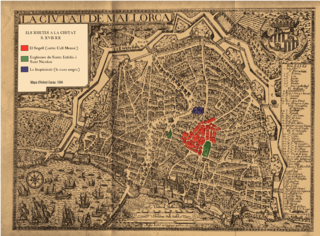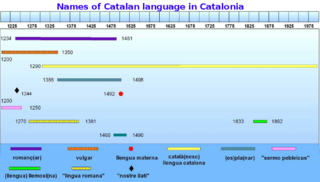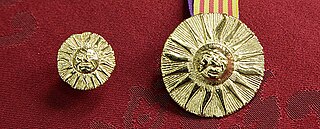
Mallorca, or Majorca, is the largest of the Balearic Islands, which are part of Spain, and the seventh largest island in the Mediterranean Sea.

Catalan literature is the name conventionally used to refer to literature written in the Catalan language. The focus of this article is not just the literature of Catalonia, but literature written in Catalan from anywhere, so that it includes writers from Andorra, the Valencian Community, Balearic Islands and other territories where any Catalan variant is spoken.

Port de Pollença is a small town in northern Majorca, Spain, on the Bay of Pollença about 6 km east of Pollença and two kilometres southeast of Cala Sant Vicenç. Cap de Formentor is connected to Port de Pollença via a 13.5 km road.

Cap de Formentor is the northernmost point of Mallorca, on the Formentor peninsula.

The Xuetes are a social group on the Spanish island of Majorca, in the Mediterranean Sea, who are descendants of Majorcan Jews that either were conversos or were Crypto-Jews, forced to keep their religion hidden. They practiced strict endogamy by marrying only within their own group. Many of their descendants observe a syncretist form of Christian worship known as Xueta Christianity.

Ramon Pelegero Sanchis, who takes the stage name of Raimon, is a Spanish singer. He performs in the musical style of Nova Cançó, and in the Catalan language.

The first names, or glossonyms, of the Catalan/Valencian language formed in a dialectal relation with Latin, in which Catalan existed as a variety. These names already expressed the relationship between the two languages. New names that related Catalan to Rome came about to dignify the Catalan language in the thirteenth century, though Latinists called it vulgar and the people planus, or pla.

Gabriel Janer Manila is a Spanish university professor, translator and writer. He is well-known across Spain for being a prolific author who has worked in almost every genre.

Proposta per les Illes, or simply El Pi, is a liberal Balearic autonomist political party, formed in November 2012 from the merger of several nationalist and regionalist parties: Convergència per les Illes, the Lliga Regionalista de les Illes Balears, the Menorcan Union and Es Nou Partit. The party's two main leaders are Jaume Font and Josep Melià. As the merger of parties from Mallorca, Menorca and Ibiza, el PI has elected representatives on each of these three islands, including 6 mayors and 82 councillors in 34 municipalities.

Maria Aurelia Capmany i Farnés was a Catalan novelist, playwright and essayist. She was also a prominent feminist cultural and anti-Franco activist.

Mossèn Costa i Llobera Gardens is a botanical garden in the center of Barcelona, Catalonia, Spain. It is situated at the foot of Montjuïc facing the sea.
Aurora Díaz-Plaja i Contestí was a Catalan writer and librarian. Born in Barcelona, Díaz-Plaja also worked as a critic, journalist, lecturer, and translator during her career. She was the sister of the writers Ferran Díaz-Plaja i Contestí and Guillem Díaz-Plaja i Contestí. Her published work included topics such as library management, as well as stories for small children, in both Catalan and Spanish.

Pollentia was a Roman city founded by Quintus Caecilius Metellus Balearicus in the present city of Alcúdia, allegedly in the year 123 BC.

The Ramon Llull Award is an honor awarded annually by the Government of the Balearic Islands to persons or entities of the Balearic Islands that have excelled in any field. It was established in 1997 by Decree 3/2014.

Maria Antònia Salvà i Ripoll was a Mallorcan poet and translator, and the sister of the politician Antoni Salvà i Ripoll and the painter Francesc Salvà Ripoll. She was the first female poet in the Catalan language.

Miquel Costa i Llobera was a Spanish poet from Majorca. He mainly wrote in Catalan language.

Miquel de Palol i Muntanyola is a Catalan architect, poet and storyteller, son of the archaeologist Pere de Palol.

Nuredduna is a character created by the poet Miquel Costa i Llobera. She is a sibyl from the Balearic Islands, and the heroine of the epic poem titled La deixa del geni grec.



















